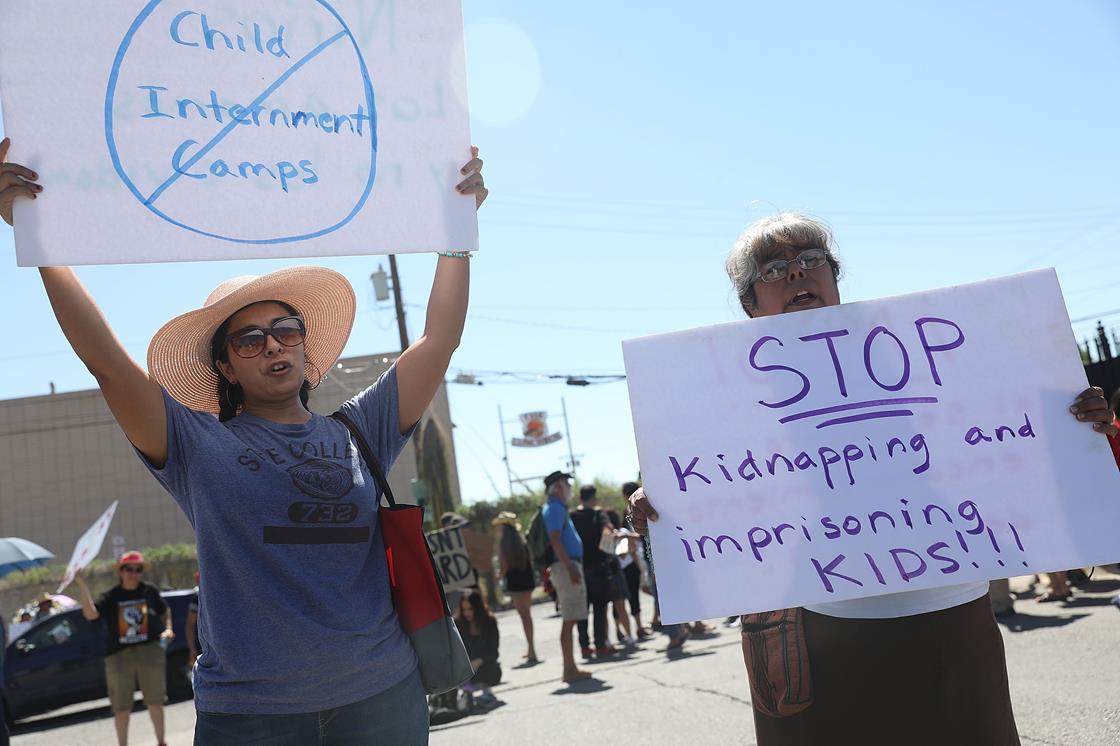
Joe Raedle/Getty Images
New statistics: the government is separating 65 children a day from parents at the border
Government officials aren’t sure how many families have been reunited: “We are still working through the process.”
By Dara Lind
Trump administration officials said Tuesday that 2,342 children have been separated from 2,206 parents at the US-Mexico border between May 5 and June 9 as part of the Trump administration’s “zero tolerance” policy of prosecuting people who cross the border illegally.
The new numbers are the best indication of how many families have been separated since Attorney General Jeff Sessions and officials from the Department of Homeland Security announced their “zero tolerance” policy in early May.
Last week, the government declared that 1,995 children had been separated from their parents from April 19 to May 31 — an average of 46 a day. But that included a few weeks before the “zero tolerance” policy was in full effect. The new numbers, which fit pretty neatly into the amount of time that the policy has been in place, show that under “zero tolerance,” an average of 65 children have been separated from parents each day.
The parents have been referred for prosecution in criminal court — overwhelmingly for the misdemeanor offense of entering the country illegally for the first time — while the children are reclassified as “unaccompanied alien children” and sent into the care of the Office of Refugee Resettlement, part of the Department of Health and Human Services.
Some of those children are being placed in temporary facilities, and HHS is trying to find and build new ones — including new “soft-sided shelters” on military bases in Texas, which press reports have referred to as “tent cities.” Those aren’t intended to house children indefinitely; they’re intended to be used in the short term as HHS officials attempt to find a sponsor for the child, such as a relative or close friend, or shift the child to alternative long-term care in a licensed facility.
Steven Wagner, the acting assistant secretary for the Administration for Children and Families — the HHS division that includes the Office of Refugee Resettlement — said on a Tuesday call with reporters that the new “soft-sided” shelters will be used only to house teens, not younger children. (In reply to a question about where girls and young children are being kept — since reporters have only been allowed into facilities housing boys 10 or older — DHS said that they’ll have new footage of facilities in the next 48 hours.)
Wagner told reporters that while his department is “under a legal obligation” to place children “expeditiously” with a sponsor, “we actually don’t have a time limit in terms of days” that children are allowed to stay in HHS care.
Furthermore, he implied that even when separated children have relatives in the US, HHS will still keep them in custody — in a facility close to where their parents are being detained — if it thinks it has a chance of reuniting the family eventually.
“Our overwhelming objective,” Wagner said, “when we’re aware of the presence of a parent in the United States, is to reunite (the child) with the parent,” even if that means waiting for the parent to get out of detention, either on bond or upon being deported.
Wagner was unable to say how many separated children have been placed with sponsors or reunited with their parents. “This policy is still relatively new,” he said. “We are still working through the process of reuniting kids with their parents after adjudication.” In other words, reuniting them after the parent’s full asylum case has been completed, which can take months or years.
An ICE spokesperson told Adolfo Flores of BuzzFeed on Monday that “reunification typically does not occur until the removal stage of the process.” A lawyer for the law firm Jones Day working on behalf of families seeking asylum told the New York Times that “some of the women we have encountered in detention at the border have reported facing pressure to deport voluntarily in order to be reunified with their children.” But lawyers also report that parents are being deported alone.
CORRECTION: This article originally misreported the author’s own math to say that an average of 60 children, rather than 65, were being separated. The author apologizes for accidentally understating the scope of the issue.
Comments
Post a Comment